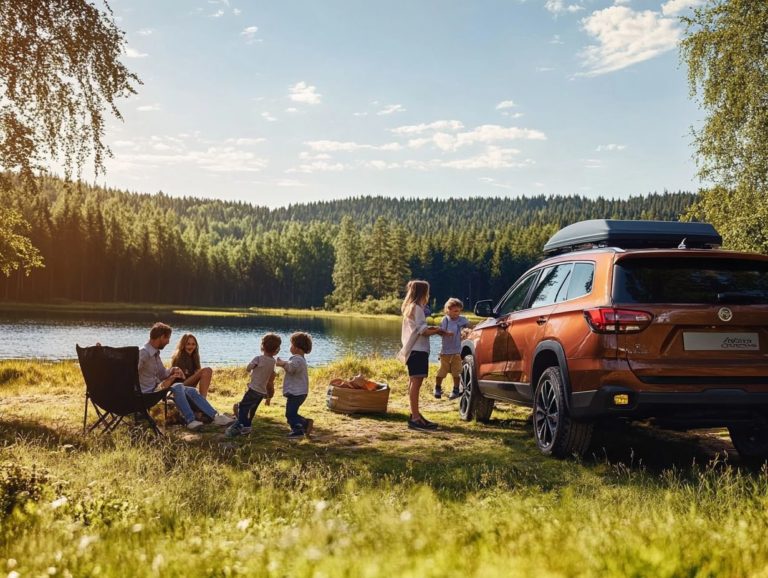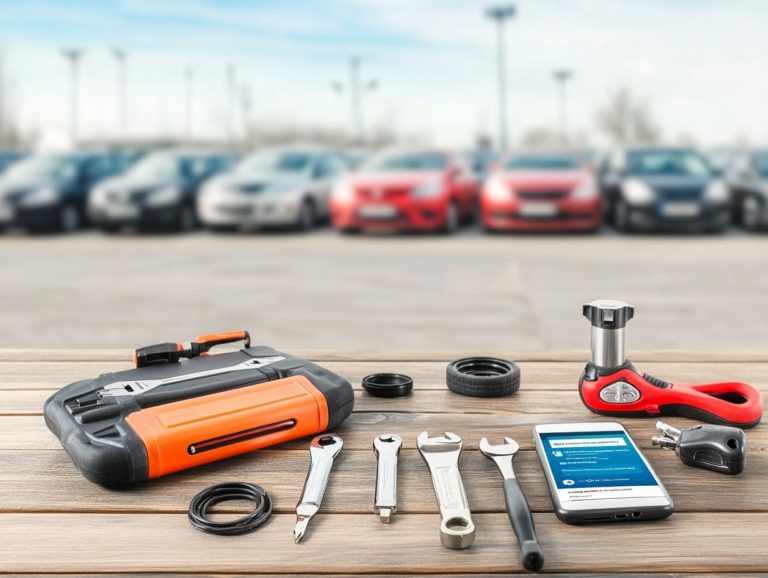5 Common Myths About Buying Used Cars
Considering the purchase of a used car? While it may seem like a smart financial move, many misconceptions could cloud your judgment.
You might think that used cars are more likely to break down, incur higher insurance costs, and lack reliability.
Get ready to uncover five surprising myths about used cars that could save you money and hassle! This article also highlights the advantages of choosing pre-owned vehicles, offers guidance on making an informed purchase, and identifies brands known for their reliability.
Prepare to distinguish fact from fiction and confidently make the best choice for your next vehicle!
Contents
- Key Takeaways:
- 1. Used Cars Are More Likely to Break Down
- 2. Used Cars Have Higher Insurance Costs
- 3. Used Cars Are More Expensive in the Long Run
- 4. Used Cars Have No Warranty
- 5. Used Cars Are Not Reliable
- What Are the Advantages of Buying a Used Car?
- Frequently Asked Questions
- Q1: Are used cars unreliable and prone to breaking down?
- Q2: Is it true that used cars have a shorter lifespan compared to new cars?
- Q3: Do used cars come with hidden costs or fees?
- Q4: Are used cars more difficult to finance compared to new cars?
- Q5: Is it true that buying a used car means sacrificing quality?
- Q6: Should I avoid buying a used car because of potential safety issues?
Key Takeaways:
- Used cars aren’t always more likely to break down than new cars if properly maintained.
- Insurance for used cars can often be less expensive due to lower market value.
- Though the upfront cost may seem high, used cars can save you money with lower insurance and depreciation.

1. Used Cars Are More Likely to Break Down
The belief that used cars are more prone to breakdowns is a common concern among potential buyers. However, many pre-owned vehicles can be reliable choices if you review the vehicle history and maintenance records, along with considering the 5 essential features in a used car before buying.
Industry statistics show that about 20% of used cars face significant issues within the first year of ownership, while only about 5% of new vehicles encounter the same fate. By scrutinizing comprehensive vehicle history reports, you can reduce the chances of unexpected problems.
Reputable dealerships often offer used cars that have been inspected and meet certain standards, giving you reassurance about their quality and reliability. This transparency regarding maintenance history not only builds trust but also positively shapes buyer perceptions, making the pre-owned market an appealing alternative to brand-new vehicles.
2. Used Cars Have Higher Insurance Costs
While it s common to think that used cars come with steep insurance costs, this can vary based on the specific features of the vehicle and your chosen financing options. For the savvy buyer, a used car can be a surprisingly budget-friendly choice.
The model, overall condition, and safety features of the car are key factors in determining your insurance premiums. Generally, sedans or compact cars tend to offer lower rates compared to luxury vehicles. The vehicle’s age and maintenance history also significantly impact costs.
Safety features, like anti-lock brakes and airbags, enhance your overall safety and can also lead to discounts on your insurance premiums. On the other hand, new cars often have higher insurance costs due to depreciation rates and replacement values.
It s essential to understand the various financing options available to you. Choosing the right payment plan can help you minimize long-term expenses, allowing you to enjoy the perks of your purchase without straining your budget.
3. Used Cars Are More Expensive in the Long Run
The belief that used cars are pricier in the long run often arises from hidden maintenance costs and unclear financing rates, especially when considering the resale value of pre-owned vehicles.
This myth can lead you to rush your decision-making, obscuring the potential benefits of investing in a second-hand car. While older cars might require more frequent repairs, considering 5 tips for buying used cars from private sellers can help ensure these costs can sometimes be balanced out by the significantly lower purchase prices compared to new models.
As a savvy buyer, you can find used cars with excellent reliability records, minimizing unexpected expenses. When evaluating long-term costs, it’s vital to weigh these factors against potential savings.
Additionally, the substantial depreciation drop for used vehicles often leads to better resale values down the line, making informed choices essential for achieving overall financial advantages.
Ready to find your perfect used car? Let s go shopping!
4. Used Cars Have No Warranty

Many people think used cars have no warranty. This isn t true; many reputable dealerships offer extended warranties to enhance your buying experience.
These options protect you from unexpected repair costs and increase the value of your vehicle. Extended warranties give you extra years of coverage beyond the factory warranty, which is great for higher-mileage cars.
Certified pre-owned programs ensure the car has passed strict inspections. This gives you more confidence in your purchase.
Understanding warranty options helps you make informed decisions. This leads to a smoother, more satisfying car-buying experience.
5. Used Cars Are Not Reliable
Many believe that used cars are unreliable. This myth can deter buyers, but many used vehicles offer dependable transportation when properly maintained. To make a wise choice, it’s important to know the top mistakes to avoid when buying used cars.
Statistics show that nearly 70% of used cars can reliably run for over 150,000 miles, especially if they come from durable brands. Vehicle inspections reveal hidden issues that could affect performance later.
Brands like Toyota and Honda are known for their reliability and longevity. You can buy a used car with confidence when it has been properly evaluated.
What Are the Advantages of Buying a Used Car?
Buying a used car offers numerous advantages. You can find modern vehicles in great condition at lower prices, along with favorable financing options.
Used cars depreciate more slowly than new models. This means your investment maintains its value better.
Insurance costs are often lower for used vehicles, providing even more savings. The variety in the market allows you to find cars that fit your preferences.
With research and informed choices, you re likely to find reliable cars that meet your expectations without straining your budget.
What Factors Should Be Considered When Buying a Used Car?
Several key factors deserve your attention when buying a used car. Consider the vehicle’s condition, ensure thorough inspections, and explore financing options.
Diving into the vehicle’s maintenance history is essential. Look for records of oil changes, brake inspections, and significant repairs.
Check safety features like airbags and anti-lock brakes. Performance ratings can offer insights into reliability and satisfaction.
Don’t skip a pre-purchase inspection; it s crucial for uncovering hidden problems. Ask about financing options and warranty coverage, as they greatly affect your buying experience.
How Can One Ensure They Are Getting a Good Deal on a Used Car?

To secure a great deal on a used car, you should begin by conducting thorough online searches for vehicle history reports. Engage in price negotiations and compare prices across reputable dealerships to ensure you re getting the best value possible.
Beyond these initial steps, it s essential to equip yourself with knowledge about current market prices and trends. This knowledge enhances your negotiating power.
By understanding how similar models and their conditions influence pricing, you can present compelling arguments for a lower price. Utilizing vehicle history can be a game-changer. Highlighting any past accidents or maintenance issues during discussions can create opportunities for further discounts.
Explore different financing options before making a commitment. This flexibility allows you to maximize your overall savings on this important purchase.
What Are the Most Reliable Used Car Brands?
Certain used car brands are celebrated for their reliability, making them an excellent choice if you’re aiming to keep expenses down while enjoying top-notch vehicle features.
Take Toyota and Honda, for example. They re known for their longevity and low maintenance costs. They often require fewer repairs over time compared to other manufacturers.
Both brands also enjoy high customer satisfaction ratings. This is thanks to their impressive fuel efficiency and comfort features that cater to a diverse range of drivers.
Then there s Subaru, recognized for its all-wheel-drive options. This enhances its reputation with robust safety features ideal for families.
On the tech front, Nissan impresses with its advanced technology offerings while keeping repair costs relatively low. By considering these factors, you can confidently make a well-informed decision when selecting a used vehicle that perfectly aligns with your budget and lifestyle.
How Can a Used Car Be Inspected Before Purchase?
Conducting a thorough vehicle inspection, often called a check before buying a car, is essential for uncovering hidden issues before you finalize the purchase. This step helps you avoid costly mistakes!
Your comprehensive assessment should start with a visual inspection of the vehicle s exterior and interior. Look for signs of wear and tear that could suggest past damage.
Next, evaluate the condition of key components such as the engine, brakes, and tires. These elements play a significant role in the car’s overall performance and safety.
Enlisting professional inspection services can offer you expert insights and a detailed report. This can pinpoint any potential problems that may not be immediately visible.
This meticulous and systematic approach not only boosts your confidence in the buying decision, but also helps you avoid unexpected repair costs down the road.
What Are the Common Misconceptions About Buying a Used Car?
Many common misconceptions surround the purchase of used cars, such as the belief that they are always unreliable or lack warranties. Understanding these 5 common myths about new car buying can help prevent misunderstandings and improve your overall satisfaction in the used car market.
These misunderstandings can act as a barrier, preventing you from exploring affordable and dependable transportation options. For instance, countless buyers have found that certified pre-owned vehicles often come with warranties comparable to those of new cars, providing peace of mind without straining your budget.
Industry reports indicate that many older models exceed reliability expectations. Customer testimonials praise their longevity and consistent performance.
By illuminating these prevalent misconceptions, it’s evident that adopting a more informed perspective can enhance your confidence and satisfaction as a used car enthusiast. For instance, learning about ways to save money on a used car purchase can make a significant difference.
Frequently Asked Questions

Q1: Are used cars unreliable and prone to breaking down?
No, this is a common myth about buying used cars. While some used cars may have a higher risk of breaking down, this is not always the case. For new car buyers, it’s important to be aware of 5 things every new car buyer should know.
It depends on the maintenance and condition of the specific car, just like with any other vehicle.
Q2: Is it true that used cars have a shorter lifespan compared to new cars?
No, used cars can last just as long as new ones. Their lifespan depends on mileage, maintenance, and driving habits. A well-maintained used car can offer many years of reliable service.
This is a myth! When buying a used car from a trustworthy dealer or private seller, all costs should be clear before finalizing the sale. To ensure you make informed decisions, check out these essential tips for buying used cars. Always review documents carefully before signing.
Q4: Are used cars more difficult to finance compared to new cars?
Not always. Some lenders, which are banks or financial institutions that provide money for car purchases, may have stricter rules for used car financing, but many options are available. Research and compare financing offers to find the best deal.
Q5: Is it true that buying a used car means sacrificing quality?
No, that s a common misconception. Many used cars are in great condition and can match new cars in quality at a lower price. Certified pre-owned cars undergo thorough inspections and often include warranties for added confidence.
Q6: Should I avoid buying a used car because of potential safety issues?
This isn t necessarily the case. While older cars may lack some modern safety features, many used cars have advanced safety technology. Research the specific make and model to find out about its safety features!






